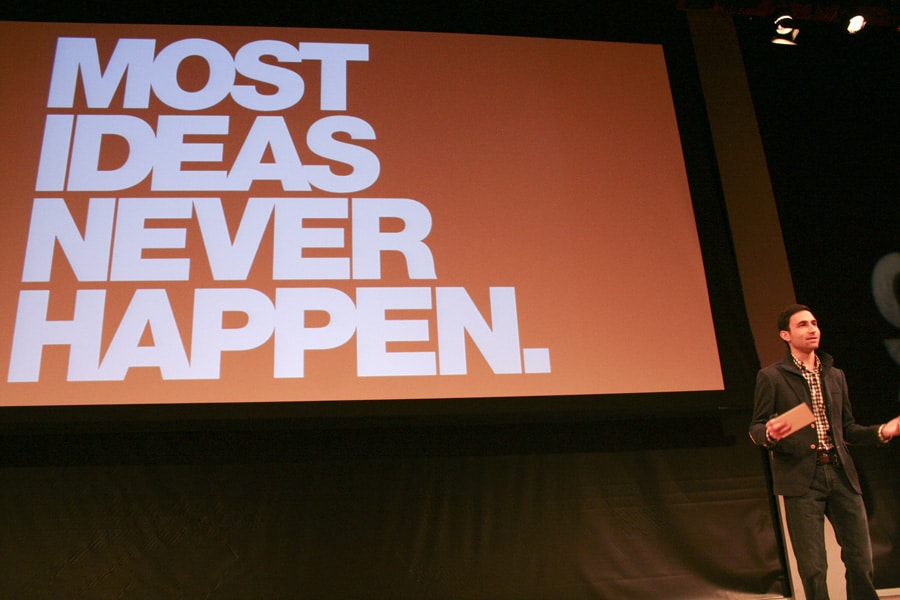Scott Belsky was the speaker I was most looking forward to at Catalyst Dallas. I don’t know anything about his spiritual inclinations, but I love his 99% blog and tweets. Great, great insights on making ideas happen – systems, leadership, etc.
And Scott did not disappoint. Best talk, by far, at Catalyst Dallas on Day 1. I only wish he had twice the allotted time because he breezed through about 100 brilliant points that he could have camped out on for hours.
My favorite takeaway (among the MANY):
- Creativity x Organization = Impact
5 x 0 = 0
100 x 0 = 0
5 x 20 = 100
[So basically – you could be insanely creative, but without organization you’re result is zero. And additionally, a little creativity with great organization can outperform amazing creativity without organization.]
Here’s my best attempt at notes from his talk:
Why do most ideas never happen?
- When a new idea strikes, energy and excitement are really high
- Then we call meetings and we have discussions, and our inbox piles up with emails
- Over time energy/excitement dissipates
- To return to the high of a new idea, we just scrap the old idea and start a new idea
- Ideas don’t happen just because they’re great (there is no meritocracy of ideas where the best ideas always win out)
- There are other forces at play
Here’s why they don’t happen:
- The gravitational force of day to day operations
- You get back to your desk and get overwhelmed
- Lack of Feeling Organized
- Lack of Accountability
- Never tell anyone about our idea and no one ever benefits from it
- Lack of Feedback exchange — you see the fatal flaws in others ideas but never tell them
- Lack of Leadership Capability
- When you do exit interviews, why are people leaving -Â Often they feel like they are not being fully utilized
How do we defy the odds and make ideas happen?
Creativity/Ideas + Organization/Execution + Communal Forces + Leadership Capability = Making ideas happen
Organization/Execution
- We are bombarded An endless stream of stuff (emails, texts, tweets, voicemail, mail, facebook messages)
- We are all pecking away at all the inboxes of our life
- We are living someone else’s to-do list
- We lose the sacred space of deep thinking — the shower is our last refuge
- We need to force ourselves to be proactive and have deep thinking
- Create Windows of non-Stimulation in your day — 2-3 hours of unplugging
- Working on long-term plans
- Unplugging is the competitive advantage of the digital age
- Creativity x Organization = Impact
5 x 0 = 0
100 x 0 = 0
5 x 20 = 100
- What company was recognized for the world’s best supply chain management? Apple
- COO Tim Cook could be just as important in that company as Steve Jobs
- The key to success in their study of the best creators in the world: Organize with a bias to action
- Have an intolerance for unactionable meetings
- Have a culture of capturing action steps — End your meeting with capturing actions
“I’m going to email this guy”
“I’m going to redraft this”
- What ends up happening is you catch misses and duplication:
“Oh, I thought you were going to also do this”
“Oh, I thought I was going to do that”
- It provides immediate accountability
- Write actions down when they happen
- Reduce your amount of insecurity work -Â Twitter, facebook, blog
- Stuff we’re just doing to assure ourselves that everything is OK (people are still reading my blog, still following me on Twitter)
- Find those things that don’t move the ball forward and cut it out or delegate it or reduce it
- Never stop optimizing
- We don’t want to fix something if it isn’t broken
- Do experiments — cancel the weekly staff meeting; have a stand up meeting; see how it goes
Communal Forces
- There are three types of people: Dreamers, Doers, Incrementalists
- Dreamers — going to bed thinking about what new they can put in the system
- Doers — wait a second we have a budget, a timeline; go to bed happy when there is nothing new in the pipeline
- Incrementalists — rotates between the two; problem — create too many things that never scale
- We need to recognize what roles people play
- Share ideas liberally
Every time Chris Anderson has an idea — he throws it up on his blog
His community starts to nag him about his ideas
He relies on this constant pressure to follow up on ideas
Aren’t you scared people are going to steal your ideas and throw out ideas too soon? The benefits outweigh the risks
- Share ownership of ideas
Doing things your way strips people of ownership. If you step in to correct what they are doing (to tweak it, to make it 100% instead of 95% good) — that person is now unlikely to stay up late at night working on the project
- Seek Competition
We pace ourselves with other folks
Tuning in to what other people are doing helps us take the next step
- Overcome the stigma of self-marketing
Respect based self-marketing
Curators in what’s interesting to them
Blogs, twitter
People can tune in and follow us
Then when we have something we want people to know about, we don’t have to spam, we just let our followers know
- Innovation by tolerating failure
- Innovation happens thru rapid failure
- But what do we usually monitor and keep stats on? Success
- How do we in organizations encourage innovation? Free up some staff for a short time to try new things without success criteria
- Push People into their intersection; people operate best at the intersection of these three:
Interests — what keeps them up at night
Skills —
Opportunities (around them)
- All of the remarkably successful people — at some point someone told them they were crazy
- When people tell you are crazy — you’re either crazy or you’re really on to something
Nothing extraordinary is ever achieved thru ordinary means
What was the biggest takeaway for you? What has helped you make your ideas actionable?


